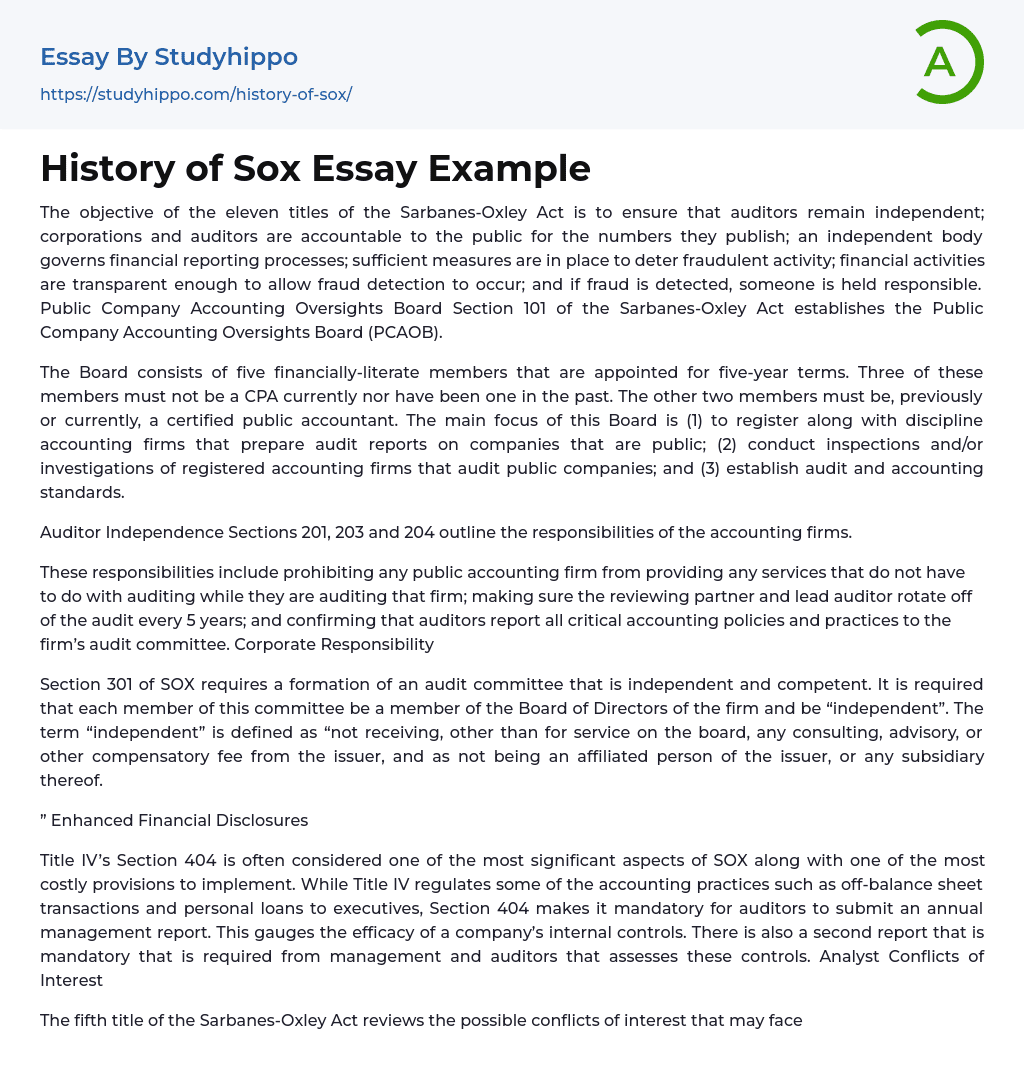The Sarbanes-Oxley Act includes eleven objectives, which aim to promote auditor independence, ensure corporate and auditor accountability to the public, establish an independent body for financial reporting, deter fraudulent activities through sufficient measures, and hold someone responsible if fraud is detected. Section 101 establishes the Public Company Accounting Oversights Board (PCAOB), consisting of five members appointed for five-year terms, three of whom cannot be current or former CPAs, while the other two must be certified public accountants. The PCAOB's main focus is to register and discipline accounting firms that prepare audit reports on public companies, conduct inspections and/or investigations of registered accounting firms that audit public companies, and establish audit and accounting standards. Sections 201, 203, and 204 outline the duties of accounting firms, which include prohibiting them from providing any non-auditing se
...rvices while auditing a firm.To ensure compliance with the Sarbanes-Oxley Act (SOX), companies must adhere to certain regulations. One of these regulations under Section 301 requires the formation of an audit committee that is independent and competent. The committee must consist of members of the Board of Directors who are "independent" according to the definition provided. They must not receive any compensation other than for board service and cannot be affiliated with the issuer or any subsidiary thereof.
Another key provision of SOX is Title IV's Section 404, which is costly but significant in regulating accounting practices such as off-balance sheet transactions and personal loans to executives. This section mandates that auditors submit an annual management report to gauge a company's internal controls. Furthermore, management and auditors must provide a second report assessing these controls. To comply with SOX, companies must also ensure
that reviewing partners and lead auditors rotate off of audits every 5 years and that all critical accounting policies and practices are reported to the firm's audit committee.The Sarbanes-Oxley Act has a section, the fifth title, that deals with potential conflicts of interest that securities analysts may encounter when dealing with publicly traded companies. This title is designed to create more trust in securities research and protect the independence and objectivity of securities analysts. The sixth title of the Act increases the resources and authority available to the Securities and Exchange Commission (SEC), which includes the power to discipline and prohibit advisors and stockbrokers from practicing. It also grants the courts the authority to prohibit the offering of penny stocks. The seventh title focuses on various studies and reports to be conducted by the Government Accountability Office (GAO), including consolidation of public accounting firms, credit rating agencies, violators and violations, enforcement actions, and investment banks. The Sarbanes-Oxley Act also covers corporate and criminal fraud accountability.
- Accounts Receivable essays
- Auditor's Report essays
- Balance Sheet essays
- Costs essays
- Financial Audit essays
- International Financial Reporting Standards essays
- Tax essays
- Accountability essays
- Cash essays
- Principal essays
- Management Accounting essays
- Internal Control essays
- Accounting Software essays
- Cash Flow essays
- Money essays
- Financial Accounting essays
- Market Segmentation essays
- Supply And Demand essays
- Purchasing essays
- Forecasting essays
- Legacy essays
- Bank essays
- Corporate Finance essays
- Financial News essays
- Financial Ratios essays
- Financial Services essays
- Free Market essays
- Shareholder essays
- Personal finance essays
- Equity essays
- Financial Crisis essays
- Banking essays
- Credit Card essays
- Currency essays
- Debt essays
- Gold essays
- Loan essays
- Enron Scandal essays
- Foreign Exchange Market essays
- Investment essays
- Venture Capital essays
- Stock Market essays
- Retirement essays
- Donation essays
- Net Present Value essays
- Income Statement essays
- Commercial Bank essays
- Debit Card essays
- Deposit Account essays
- Subprime Lending essays




